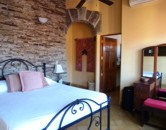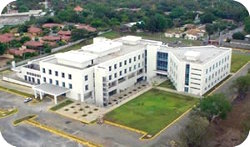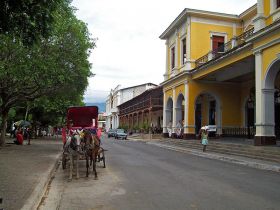How's the standard of living in Granada, Nicaragua?
John-Marc Gallagher - GPS Real Estate
The standard of living in Granada, Nicaragua  is subjective. It’s completely different for the native Nicaraguan, who makes $600 to $1,000 a month, as compared to the standard of living for the expat.
is subjective. It’s completely different for the native Nicaraguan, who makes $600 to $1,000 a month, as compared to the standard of living for the expat.
 is subjective. It’s completely different for the native Nicaraguan, who makes $600 to $1,000 a month, as compared to the standard of living for the expat.
is subjective. It’s completely different for the native Nicaraguan, who makes $600 to $1,000 a month, as compared to the standard of living for the expat. Even discussing the standard of living for the typical expat in Granada, Nicaragua is all over the board because there are expats who are living solely on Social Security, all the way to expats who are multi-millionaires who have homes in three...
The standard of living in Granada, Nicaragua  is subjective. It’s completely different for the native Nicaraguan, who makes $600 to $1,000 a month, as compared to the standard of living for the expat.
is subjective. It’s completely different for the native Nicaraguan, who makes $600 to $1,000 a month, as compared to the standard of living for the expat.
 is subjective. It’s completely different for the native Nicaraguan, who makes $600 to $1,000 a month, as compared to the standard of living for the expat.
is subjective. It’s completely different for the native Nicaraguan, who makes $600 to $1,000 a month, as compared to the standard of living for the expat. Even discussing the standard of living for the typical expat in Granada, Nicaragua is all over the board because there are expats who are living solely on Social Security, all the way to expats who are multi-millionaires who have homes in three different locations of the world and where their home in Granada is just one of their homes, and they spend a couple months here, a couple months, for example, in Ecuador, some time in Spain, etc.
Discussing the standard of living in Granada, Nicaragua is not like discussing the standard of living in the United States, for example, in Miami. In Granada, there is no average per se because of the interesting diversity of the people living here.
Relative to what you could buy in and what standard of living you would be able to attain in Granada as opposed to the United States, your money stretches a lot farther here in Granada, as a Third World country. In Granada, your basic supplies or basic “basket” (what they call in Spanish, your “canasta”) defines what it costs to live at the sustenance level. This includes things like eggs, milk, cheese, butter, rice and beans. The basic basket is much less expensive in Granada than in the US. But even above that, the cost for items such as rent, movies, dinners, all are much more affordable in Granada than in North America.
Here are some examples. The cost to build a luxury house in the US is about US $150 per square foot. You can build the same luxury house in Granada for $55 - $60 per square foot. You go out to dinner and a movie in the US for $125 and here in Granada, the same would cost you $40 - $60.
The cost for medical attention is much, much  less in Granada as compared with the US. Let’s consider, for example, elective cosmetic surgery, because its something your insurance wouldn’t pay for. In the US, it may cost you $2,500 to have your eyelids done. Here, it will cost you $450. A colonoscopy in the US would cost you $1,800 to $3,500. If your insurance covers it, it may cost $2,500, so with a deductible, you may pay $500 out of pocket. In Nicaragua, a colonoscopy is $350 total, without insurance. Here in Nicaragua I just pay for items like colonoscopies in cash (no insurance) for the same amount I would have to pay with insurance in the US. Then, I get to keep whatever my monthly insurance cost in the US would be—many, many thousands of dollars per year.
less in Granada as compared with the US. Let’s consider, for example, elective cosmetic surgery, because its something your insurance wouldn’t pay for. In the US, it may cost you $2,500 to have your eyelids done. Here, it will cost you $450. A colonoscopy in the US would cost you $1,800 to $3,500. If your insurance covers it, it may cost $2,500, so with a deductible, you may pay $500 out of pocket. In Nicaragua, a colonoscopy is $350 total, without insurance. Here in Nicaragua I just pay for items like colonoscopies in cash (no insurance) for the same amount I would have to pay with insurance in the US. Then, I get to keep whatever my monthly insurance cost in the US would be—many, many thousands of dollars per year.
 less in Granada as compared with the US. Let’s consider, for example, elective cosmetic surgery, because its something your insurance wouldn’t pay for. In the US, it may cost you $2,500 to have your eyelids done. Here, it will cost you $450. A colonoscopy in the US would cost you $1,800 to $3,500. If your insurance covers it, it may cost $2,500, so with a deductible, you may pay $500 out of pocket. In Nicaragua, a colonoscopy is $350 total, without insurance. Here in Nicaragua I just pay for items like colonoscopies in cash (no insurance) for the same amount I would have to pay with insurance in the US. Then, I get to keep whatever my monthly insurance cost in the US would be—many, many thousands of dollars per year.
less in Granada as compared with the US. Let’s consider, for example, elective cosmetic surgery, because its something your insurance wouldn’t pay for. In the US, it may cost you $2,500 to have your eyelids done. Here, it will cost you $450. A colonoscopy in the US would cost you $1,800 to $3,500. If your insurance covers it, it may cost $2,500, so with a deductible, you may pay $500 out of pocket. In Nicaragua, a colonoscopy is $350 total, without insurance. Here in Nicaragua I just pay for items like colonoscopies in cash (no insurance) for the same amount I would have to pay with insurance in the US. Then, I get to keep whatever my monthly insurance cost in the US would be—many, many thousands of dollars per year. In Granada, we live very well. If you’re living on $3,000 a month in Granada, you can afford to have a maid and a gardener / driver. You would pay each of them $200 per month. So, if you want to go out at night and you don’t want to have to drive, you can have your driver take you. And, you can have a maid all day for 5 – 6 days a week who also cooks your meals for you.
Even though you may not need as much money to live in Granada as compared with the US, your standard of living is higher in Granada. You can afford the help, either because you need it, or you just want to have a more relaxed lifestyle.
Posted August 8, 2014
Carlos Roman Gutierrez Solis - Casa Granada Properties
 The local people (the “Granadinos”; people from Granada) have a very laid back life. They do not take things fast. They wake up very early in the morning. At around 6 AM, you will see people walking to the market. For the first half of the day, the market is very intense.
The local people (the “Granadinos”; people from Granada) have a very laid back life. They do not take things fast. They wake up very early in the morning. At around 6 AM, you will see people walking to the market. For the first half of the day, the market is very intense. Some Granadinos work in farms and some work in Managua. People prefer to travel all the way to Managua from Granada because Managua is where they can get a better salary. The local...
 The local people (the “Granadinos”; people from Granada) have a very laid back life. They do not take things fast. They wake up very early in the morning. At around 6 AM, you will see people walking to the market. For the first half of the day, the market is very intense.
The local people (the “Granadinos”; people from Granada) have a very laid back life. They do not take things fast. They wake up very early in the morning. At around 6 AM, you will see people walking to the market. For the first half of the day, the market is very intense. Some Granadinos work in farms and some work in Managua. People prefer to travel all the way to Managua from Granada because Managua is where they can get a better salary. The local people who stay in Granada work in hotels, banks, or the market. They either sell food or fix things.
The daily activities in Granada are at their peak in the morning. After noon, it gets slower, easy going, and you will see people coming home from work. Those who work in the market do not need to have a car to go home because it is easier to just walk or take public transportation, since the houses are just a couple of blocks away from the market.
Many Granadinos work at a local company owned by the Chamorro family. People who work there are laborers, engineers and managers. The Chamorros also have another company that makes animal food. The Chamorro family is a wealthy family of Granadinos who own acres and acres of coffee farms, cattle farms and rice farms. The people who do not have businesses usually work for the Chamorros. When you see a very big colonial house in Granada, a Chamorro most likely owns it.
Posted October 11, 2014
Darrell Bushnell
 Given for the same income and if you’re living off social security or something similar your country of origin offered, you would live much, much better in Granada. We’re certainly living much, much better than we would in the US.
Given for the same income and if you’re living off social security or something similar your country of origin offered, you would live much, much better in Granada. We’re certainly living much, much better than we would in the US. But how do you quantify that? The only way I know how to quantify that is your happiness quotient. My wife and I are very, very happy to be living here. We appreciate Nicaragua allowing us to invest here. We try...
 Given for the same income and if you’re living off social security or something similar your country of origin offered, you would live much, much better in Granada. We’re certainly living much, much better than we would in the US.
Given for the same income and if you’re living off social security or something similar your country of origin offered, you would live much, much better in Granada. We’re certainly living much, much better than we would in the US. But how do you quantify that? The only way I know how to quantify that is your happiness quotient. My wife and I are very, very happy to be living here. We appreciate Nicaragua allowing us to invest here. We try not to be critical, although sometimes you want to be. We always look back and say we’re guests in this country, which we have to always remember. You can live very well here.
Having said that, for people trying to decide between Southern France or some other high price place and here, you’ll find that we’re not as fancy. I haven’t worn socks in 6 months. It’s very informal. In an embassy event where you would probably wear long sleeves, I would probably not go. I really enjoy it here.
You can live so much better here in Granada than in North America. We live on less than $2,000 a month and we could live on much less than that. It goes back to the topic of reinvention. What would reinvention be in US when all of the sudden your salary drops to a fifth of what it used to be? Reinvention would mean probably being a greeter in Wal-Mart, while here in Nicaragua, you can start a business or better yet a charitable foundation. For example, you may say, “Wow, there’s a nice little community and I really like the people there, so I think I’ll start a library.” Well, for a few thousand dollars here in Nicaragua, you would do it. You couldn’t do any of those things back in the States like that, because the permits would cost you more than that, not to mention the people fighting you.
Combining the opportunity for reinvention and the amplification of your spending power, you can live very well here. But, people who expect the same service as in the US are not going to make it here. We do have people who come down here and a lot of people don’t make it. They come down here and ask things such as, “Where do I call to get the ambulance to the hospital?” My response is, “You’re kidding. You’re not going to call any ambulances here. You got to jump at a taxi cab or call a friend who has vehicle.” While the healthcare is excellent, those extras don’t make it.
Or somebody may say, “I called up the police and it took them 30 minutes to arrive.” My response would be, “Wow, congratulations. It took me 3 days to get them here.” That’s just the way it is here. It’s a very poor country and those kind services we take for granted with our higher taxes don’t exist here. The reason is that our taxes hardly exist here.
As an example, my property tax on this new house I built -- 3,400 square feet -- is US $115 a year. For water, we have a well. My electricity bill is $70 to $80 a month and that’s mostly the pool pump and refrigerator. We don’t pay for garbage pickup, because we really don’t have it where I live now. Every two weeks I just throw a bag in the back of the pickup and drive out of town and have a friend let me leave it in front of his house when his is picked up.
(Poster for a fundraiser organized by expats for a lending library they founded in Granada, Nicaragua, pictured.)
Posted September 2, 2015


